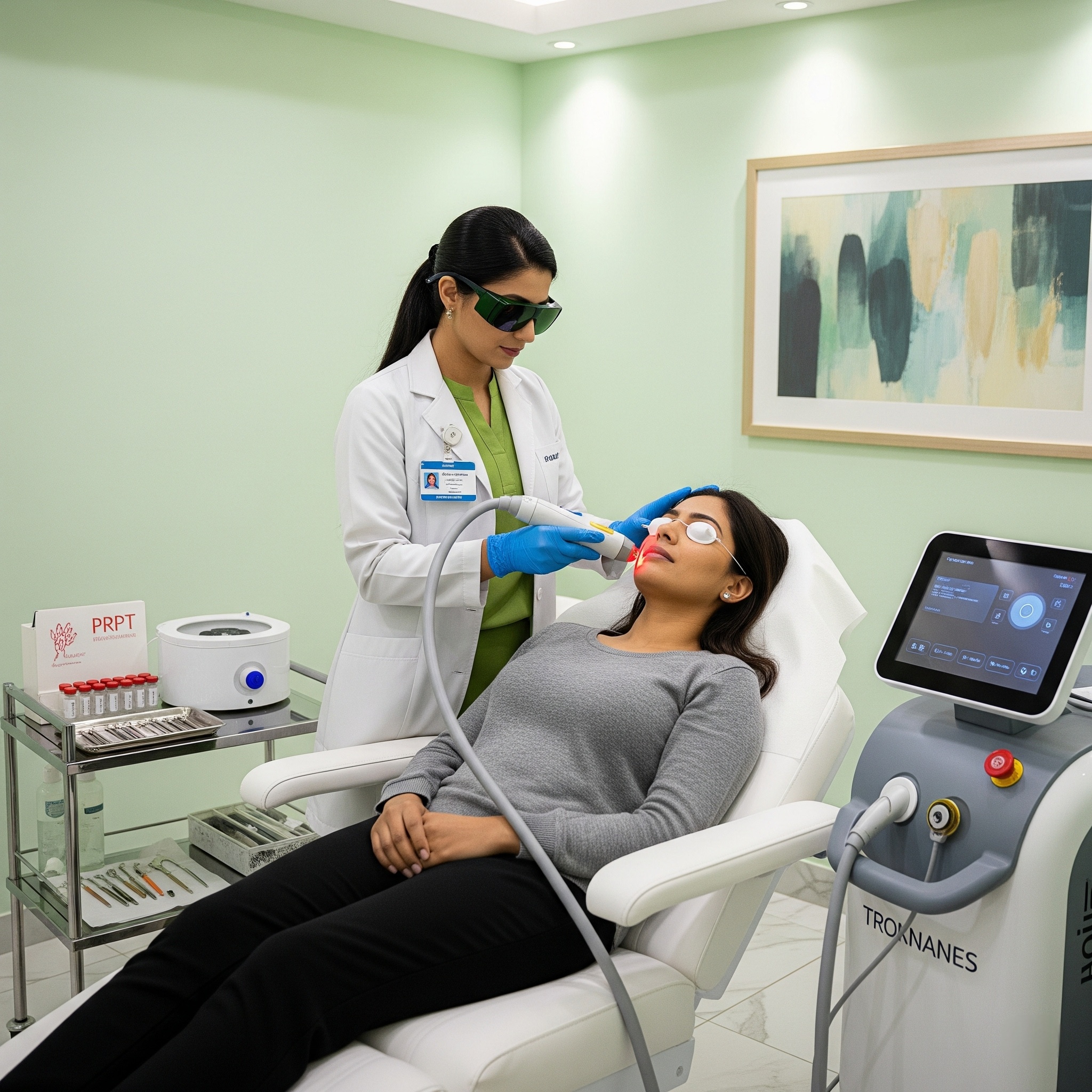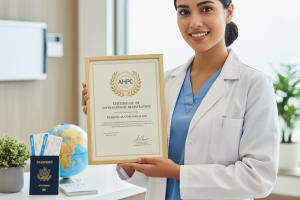
Allied Health Professionals in Pakistan – Anesthesia & Skin Care
Introduction
Healthcare in Pakistan is changing rapidly, and the role of Allied Health Professionals in Pakistan is becoming central to hospitals and beauty clinics. These professionals provide the technical, clinical, and therapeutic support that makes modern medicine possible.
Today, we see a major shift: not only in hospitals but also in the beauty and wellness industry. Across Pakistan, every city now has specialized skin care and aesthetic clinics, and almost every large hospital has developed a cosmetic wing. On social media, advertisements for skin treatments, laser procedures, and cosmetic enhancements appear daily — reflecting the booming demand. For many females, this has become both a career opportunity and a personal healthcare option.
This blog explains who Allied Health Professionals are, how they play a role in anesthesia technology and skin care clinics, and why their demand is higher than ever before.

What are Allied Health Professionals in Pakistan?
An Allied Health Professional is a trained healthcare worker who supports doctors by handling diagnostic, technical, and patient-care tasks. While doctors diagnose and prescribe, AHPs execute the procedures and operate specialized equipment.
Importance of Allied Health Professionals in Pakistan:
-
Bridging the Gap: With a shortage of doctors in Pakistan, AHPs fill critical roles.
-
Modern Technology: From lasers to anesthesia machines, they ensure safe use of advanced medical tools.
-
Patient-Centered Care: They spend time guiding patients, ensuring safety, and handling aftercare.
Examples in Pakistan:
-
Anesthesia Technologists
-
Medical Lab Technologists
-
Physiotherapists
-
Radiology Technologists
-
Skin Care & Cosmetology Technologists
Globally, AHPs make up 60–70% of the healthcare workforce (WHO), and Pakistan is steadily catching up with this trend.
Anesthesia Technology in Pakistan
Surgery is impossible without anesthesia. Behind every successful operation is an Anesthesia Technologist, an Allied Health Professional trained to assist anesthesiologists.
Education Pathways
-
Diploma in Anesthesia Technology (2 years) – Entry-level, often leading to assistant roles.
-
BS in Anesthesia Technology (4 years) – Comprehensive program covering anatomy, pharmacology, and anesthesia practice.
-
MS in Anesthesia & Critical Care (2 years) – Advanced study for senior technologist roles.
Job Opportunities
-
Government hospitals
-
Private surgical centers
-
ICU & Emergency departments
-
Cosmetic and plastic surgery clinics
Salary Range: PKR 35,000 – 90,000/month locally; significantly higher abroad.
Skin Care & Cosmetology Clinics in Pakistan
The beauty and aesthetic industry in Pakistan is booming. Once limited to beauty parlors, it has now transformed into a science-backed healthcare field.
Popular Treatments
-
Laser hair removal
-
PRP therapy for hair and skin
-
Botox & dermal fillers
-
Chemical peels & microdermabrasion
-
Acne, pigmentation, and skin rejuvenation treatments
Here, Skin Care Technologists — Allied Health Professionals trained in cosmetology — operate sophisticated machines, prepare patients, and ensure safety protocols.
Why the Demand is Rising
-
Social Media Influence: Daily exposure to beauty trends and celebrity endorsements.
-
Urban Growth: Every major city now has multiple cosmetic clinics.
-
Female-Focused Careers: Women increasingly join cosmetology as professionals and patients, making it a thriving sector.
Salary Range: PKR 30,000 – 80,000/month in Pakistan; private practice and international jobs can pay much more.
Doctors vs Allied Health Professionals – A Quick Comparison
| Aspect | Doctor (MBBS) | Allied Health Professional |
|---|---|---|
| Study Years | 5–6 years + house job | 2–4 years (Diploma/BS) |
| Focus | Diagnosis, prescribing, surgery | Technical & specialized care (Anesthesia, Skin Care, Lab) |
| Cost of Education | 50–99 lakh (private sector) | 2–8 lakh |
| Career Start | 6–7 years later | 2–4 years later |
| Salary Start | PKR 80,000+ | PKR 30,000–90,000 |
This comparison explains why many F.Sc Pre-Medical students who don’t clear MDCAT are now choosing Allied Health as a fast, rewarding career path.
Education Options in Pakistan
-
Diploma Programs (2 years): Quick entry to jobs.
-
BS Allied Health Sciences (4 years): Anesthesia, Radiology, Cosmetology, etc.
-
MS Programs (2 years): For advanced specialization, teaching, and research.
Leading Institutes: University of Lahore, Dow University, Gujranwala College of Nursing & Allied Health Sciences, and other HEC-recognized institutions.
Career Opportunities & Salaries
Local Options:
-
Hospitals & Operation Theatres
-
Dermatology & Cosmetic Clinics
-
Wellness centers & medical spas
-
Private practice after certification
Abroad:
Middle East, Europe, and UK actively hire Pakistani Allied Health Professionals.
Earning Potential:
-
Diploma holders: PKR 25,000 – 40,000
-
BS graduates: PKR 35,000 – 90,000
-
Abroad: PKR 200,000+ (after licensing)
Challenges & Safety Concerns
-
Untrained Staff (Quacks): Many uncertified workers operate in cosmetic clinics, risking patient safety.
-
Lack of Awareness: Students and patients often don’t know about Allied Health study options.
-
Weak Regulation: Pakistan needs stronger policies via Allied Health Council for standardization.
The solution: Always choose certified professionals for safety and credibility.
Future Outlook
The future for Allied Health Professionals in Pakistan is extremely promising. The combination of growing surgical demand and the explosion of skin care/aesthetic clinics ensures that opportunities will continue to expand.
As Pakistan’s middle class grows, people — especially women — are investing more in healthcare and beauty. This makes Allied Health Sciences not just a career option, but one of the fastest-growing professions in Pakistan.
FAQs
1. What is an Allied Health Professional in Pakistan?
A certified healthcare technologist or therapist who assists doctors in specialized areas like anesthesia, radiology, physiotherapy, or cosmetology.
2. Which is better: MBBS or Allied Health Sciences?
Both are respected. MBBS takes longer, while Allied Health offers faster, specialized career entry with growing demand.
3. What is the scope of Anesthesia Technology in Pakistan?
Every hospital needs anesthesia technologists for surgeries, ICUs, and cosmetic procedures. Demand is rising locally and internationally.
4. How to become a certified Skin Care Technologist?
After F.Sc Pre-Medical, enroll in a diploma or BS program in Clinical Cosmetology/Aesthetic Sciences at an HEC-recognized institution.
5. What is the salary of Allied Health Professionals in Pakistan?
Salaries range from PKR 25,000 to 90,000/month in Pakistan; abroad, earnings exceed PKR 200,000/month.
Conclusion & Call to Action
The rise of Allied Health Professionals in Pakistan shows that healthcare is no longer limited to doctors and nurses. Whether it’s ensuring safe surgeries as an anesthesia technologist or transforming lives in modern skin care clinics, these professionals are at the heart of a rapidly growing industry.
For students, especially females, Allied Health Sciences represent a future-proof career that combines healthcare, technology, and aesthetics. If you’re looking for a rewarding path beyond MBBS, now is the perfect time to explore Allied Health programs in Pakistan and join the movement shaping tomorrow’s healthcare and beauty sectors.



